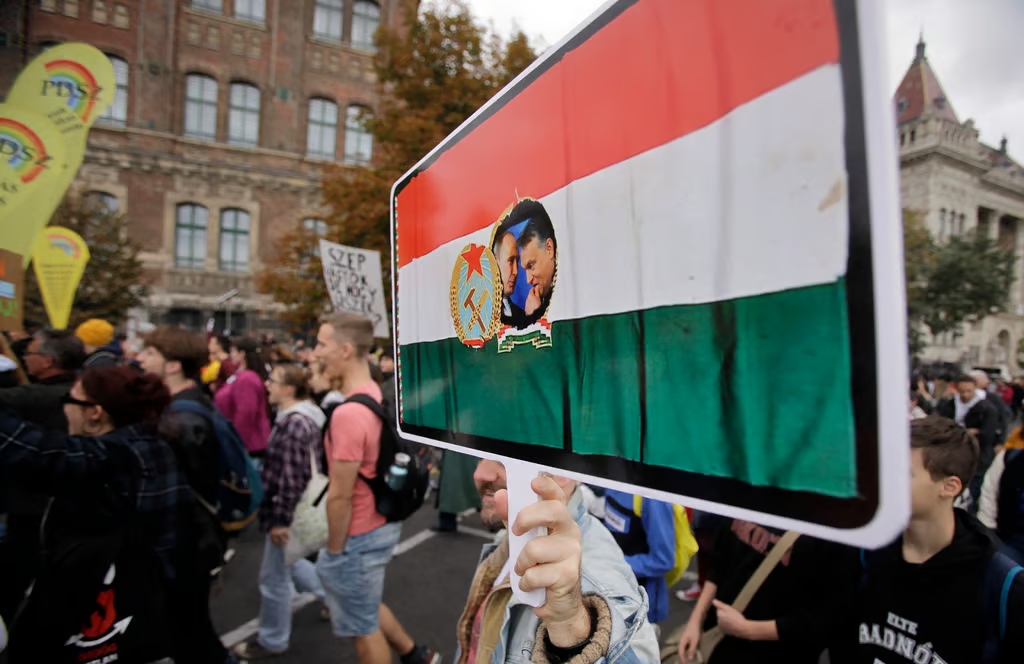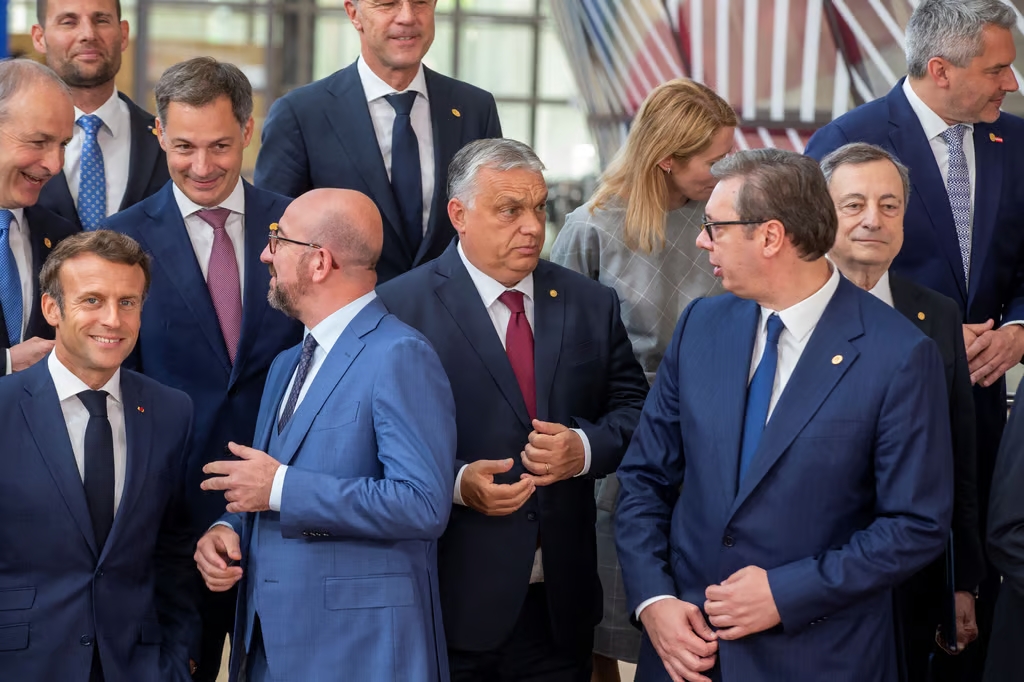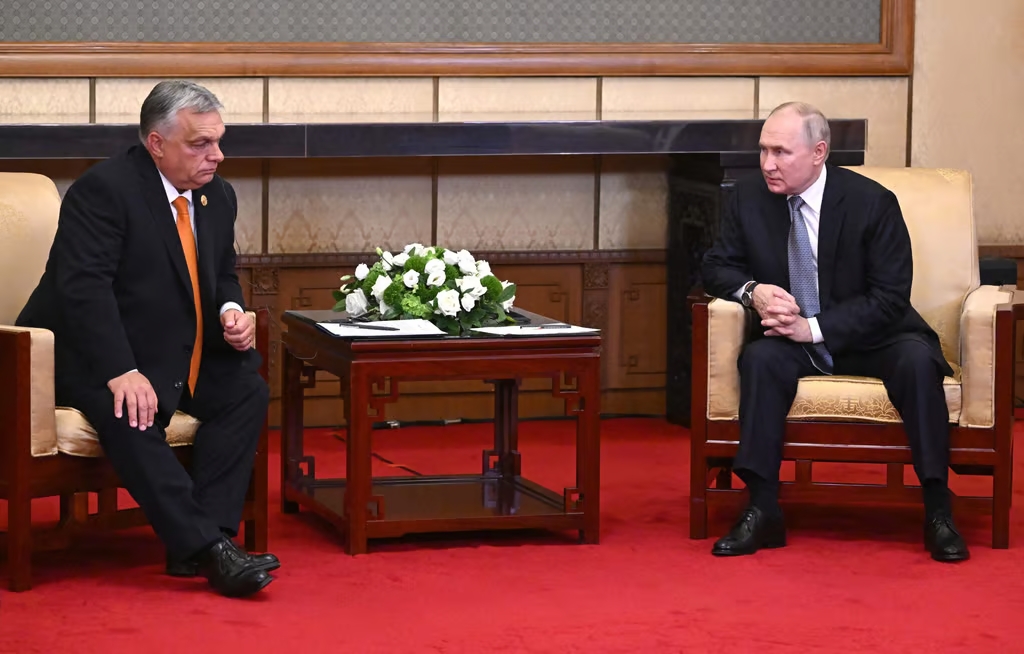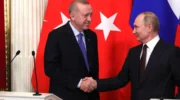This month’s summit will be a decisive test of how far Budapest will go to thwart EU support for Kyiv.
Hungarian Prime Minister Viktor Orbán regularly pushes the EU to the cliff edge, but diplomats are panicking that his hostility to Ukraine is now about to finally kick the bloc over the precipice.
A brewing political crisis is set to boil over at a summit in mid-December when EU leaders are due to make a historic decision on bringing Ukraine into the 27-nation club and seal a key budget deal to throw a €50 billion lifeline to Kyiv’s flailing war economy. The meeting is supposed to signal to the U.S. that, despite the political distraction over the war in the Middle East, the EU is fully committed to Ukraine.
Those hopes look likely to be knocked off course by Orbán, a strongman who cultivates close ties with Russian dictator Vladimir Putin and who is widely seen as having undermined democracy and rule of law at home. He is demanding the whole political and financial process should be put on ice until leaders agree to a wholesale review of EU support for Kyiv.
That gives EU leaders a massive headache. Although Hungary only represents 2 percent of the EU population, Orbán can hold the bloc hostage as it is supposed to act unanimously on big strategic decisions — and they hardly come bigger than initiating accession talks with Ukraine.
It’s far from the first time Orbán is throwing a spanner in the works of the EU’s sausage making machine. Indeed, he has been the most vocal opponent of sanctions against Russia ever since Putin’s annexation of Crimea in 2014. But this time is different, EU diplomats and officials said.
“We are heading toward a major crisis,” one EU official said, who was granted anonymity to discuss confidential deliberations. One senior EU diplomat warned this could become “one of the most difficult European Councils.”
Orbán is playing the long game, said Péter Krekó, director of the Budapest-based Political Capital Institute. “Orbán has been waiting for Europe to realize that it’s not possible to win the war in Ukraine and that Kyiv has to make concessions. (…) Now, he feels his time is coming because Ukraine fatigue is going up in public opinion in many EU countries.”
In theory, there is a nuclear option on the table — one that would cut Hungary out of EU political decisions — but countries feel that emergency cord is toxic because of the precedent it would deliver on EU disunity and fragmentation. For now, the European leaders seem to be taking to their usual approach of fawning courtship of the EU’s bad boy to try to coax out a compromise.
European Council President Charles Michel, whose job it is to forge deals between the 27 leaders, is leading the softly-softly pursuit of a compromise. He travelled to Budapest earlier this week for an intense two hour discussion with Orbán. While the meeting did not reach an immediate break-through, it was useful to understand Orbán’s concerns, another EU official said.
It’s all about the money
Some EU diplomats interpret Orbán’s threats as a strategy to raise pressure on the European Commission, which is holding back €13 billion in EU funds for Hungary over concerns that the country is falling foul of the EU’s standards on rule of law.
Others however said it’s a mistake not to look beyond the immediate transactional tactics. Orbán has long been questioning the EU’s Ukraine strategy, but was largely ignored or portrayed as a puppet for Russian President Vladimir Putin.
“We were watching it, amazed, but maybe we didn’t take enough time to actually listen,” a second senior EU diplomat acknowledged.

Increasingly, the leader of the Fidesz party has been isolated in Brussels. Previous peacemakers such as former German Chancellor Angela Merkel or other Orbán-whisperers from the so-called Visegrád Four — Slovakia, Poland, Hungary and the Czech Republic — are no longer there. The expected comeback of Donald Tusk for Poland, a pro-EU and anti-Russian leader, will only heighten Orbán’s status as the lonely, defiant hold-out.
“There is no one left to talk sense into Orbán,” a third EU official said. “He is now undermining the EU from within.”
Guns on the table
As frustration grows, the EU is weighing how to deal with the Hungarian threats.
In theory, Brussels could come out with the big guns and use the EU’s so-called Article 7 procedure against Hungary, used when a country is considered at risk of breaching the bloc’s core values. The procedure is sometimes called the EU’s “nuclear option” as it provides for the most serious political sanction the bloc can impose on a member country — the suspension of the right to vote on EU decisions.
Because of those far-reaching consequences, there is reticence to roll out this option against Hungary. When EU leaders brought in “diplomatic sanctions” against Austria in 2000, the day after the party of Austrian far-right leader Jörg Haider entered the coalition, it backfired. Many Austrians were angry at EU interference and anti-EU sentiment soared. Sanctions were lifted later that year.
There is now a widespread feeling in Brussels that Article 7 could create a similar backlash in Budapest, fueling populism and in the longer term potentially even trigger a snowball effect leading to an unintended Hungarian exit of the bloc.
Given those fears, diplomats are doubling down on ways to work around a Hungarian veto.
One option is to split the €50 billion from 2024 to 2027 for Ukraine into smaller amounts on an annual basis, three officials said. But critics warn this option would fall short in the goal of offering greater predictability and certainty to Ukraine’s struggling public finances. It would also send a bad political signal: if the EU can’t make a long term commitment to Ukraine, then how can it ask the U.S. to do the same?
The same dilemma goes for the EU’s planned military aid. EU countries could use bilateral deals rather than EU structures such as the European Peace Facility to send military aid to Ukraine — effectively freezing out Budapest. Yet this would mean that the EU as such plays no role in providing weapons, an admission of impotence that is hard to swallow and hurts EU unity toward Kyiv.
It’s “obvious” that concern is growing about EU political support for Ukraine, Lithuania’s Foreign Minister Gabrielius Landsbergis told POLITICO. “At first it’s Hungary, now, more countries are doubtful whether there’s a path.”
Asked about Hungary’s objections, Ruslan Stefanchuk, the chairman of Ukraine’s parliament, told POLITICO: “Ukraine is going to the European Union and Ukraine has followed all the recommendations (…) I want to make sure that all member states respect the progress that Ukraine has demonstrated.”
The long game
That leaves one other default option, and it’s an EU classic: kicking the can down the road and pushing key decisions on Ukraine policy to early next year. Apart from Hungary, Berlin is also struggling with the consequences of Germany’s top court wiping out €60 billion from a climate fund — thus creating a huge hole in its budget.

Such a delay would also lead to stories about fractured EU unity, said another EU diplomat. But “in the real world it wouldn’t be a problem because the Ukraine budget is fine until March 2024.”
But for others, buying time is tricky. Europe is heading to the polls in June next year, which makes sensitive decision-making harder. “Getting closer to the elections will not make things easier,” the second EU official said, while stressing that fast decisions are key for Ukraine. “For Zelenskyy, this is existential to keep up morale on the battlefield.”
Both, like another official quoted in this story, were granted anonymity to speak freely.
Increasingly, Brussels is also worried about Orbán’s long game.
There is a constant stream of attacks coming from Budapest against Brussels, on issues ranging from democratic deficit to culture wars over the EU’s migration policy. The latest example is an aggressive euroskeptic advertising campaign featuring posters targeting European Commission President Ursula von der Leyen herself. The posters show von der Leyen next to Alexander Soros, the son of George Soros, chair of the Open Society Foundations, with the line: “Let’s not dance to the tune they whistle!”
“Nobody feels comfortable given what’s going on in Hungary,” Budget Commissioner Johannes Hahn told reporters on Thursday. “It’s very difficult to digest given the campaign that he’s leading against the EU and against the president. When he’s asking his people many things, he’s not asking if the Union is so much worse than USSR why is he not leaving?”
But Orbán seems more eager to hijack the EU from within rather than jump ship, as the U.K. did. Increasingly, he also feels the wind is blowing his way after the recent election results in Slovakia and the Netherlands, said Krekó, where the winners are on the same page as him when it comes to Ukraine, migration or gender issues.
Hungary’s prime minister was quick to congratulate the winner of the Dutch election, the vehemently anti-EU Geert Wilders, saying that “the winds of change are here.”
“Orbán plays the long game,” the third EU official said. “With Wilders, one or two more far-right leaders in Europe and a potential return of Trump he could soon be less isolated than we all think.”









